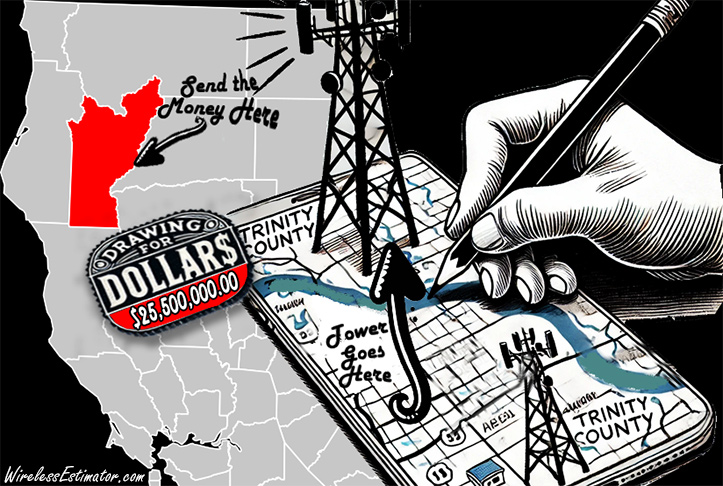
THE POORLY PRESENTED application included hand-drawn maps and limited address checks, which needed to be improved for the FCC to assess the extent of unmet needs or to validate the necessity of the proposed construction of 16 towers for $25.5 million. The Consortium only provided 20 addresses for the 1,500 students that they claimed lacked broadband service. The cost per student wasn’t discussed in the denial, but it amounted to $17,000 to reach each student in addition to the monthly broadband service fees.
The Federal Communications Commission (FCC) has released an order denying the Trinity County Connectivity Consortium’s request for $25.5 million in funding from the Emergency Connectivity Fund (ECF) to construct 16 wireless towers in Trinity and Humboldt County, California.
In reviewing their previous denial, the FCC found that the application was flawed, full of holes, and did not meet the eligibility requirements of the ECF program.
The decision stems from the Consortium’s failure to provide adequate evidence and detailed plans for immediate internet service provisions.
The ECF program, established under the American Rescue Plan Act of 2021, allocated $7.171 billion to support schools and libraries purchasing equipment and internet access services during the COVID-19 emergency.
The program specifically aimed to bridge the “homework gap” by providing immediate connectivity solutions for remote learning needs. Eligible services under this program included Wi-Fi hotspots, modems, routers, and commercially available internet services.
The Consortium, representing eight school districts in Northern California, proposed the construction of 16 towers to provide mobile broadband coverage via third-party LTE or 5G providers. The intent was to cover a vast and mountainous area, described as largely unserved by existing internet service providers, with a significant portion of the student population being unable to access remote learning due to lack of internet connectivity.
In denying the funding, the FCC said the primary purpose of the ECF program was to provide immediate internet connectivity to students and staff with unmet needs. The agency said the Consortium’s application focused solely on constructing infrastructure without directly connecting students or school staff to internet services. This approach does not align with the ECF’s emergency support goals.
The FCC said the Consortium failed to provide clear, comprehensive evidence demonstrating the unavailability of existing internet services.
The Consortium’s documentation included screenshots from provider websites and coverage maps, but more detail was needed to confirm that no commercial options were available.
The FCC also noted that the Consortium needed to offer a clear plan for ensuring that students and school staff would gain access to and afford the proposed internet services. The proposed timeline and execution strategy are needed to meet the ECF’s requirement for quick implementation within the emergency period.

















